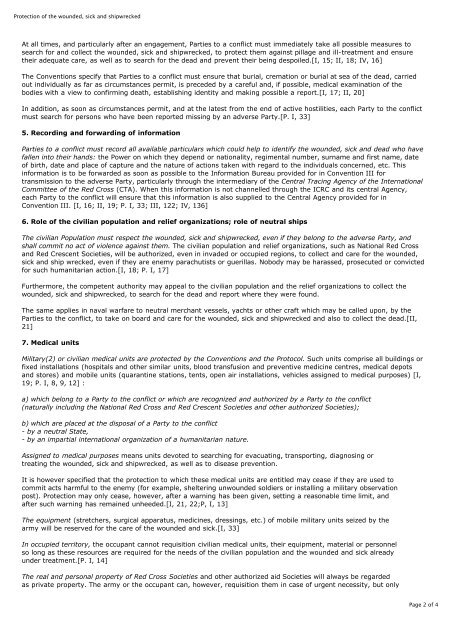The Law of War
The Law of War
The Law of War
You also want an ePaper? Increase the reach of your titles
YUMPU automatically turns print PDFs into web optimized ePapers that Google loves.
Protection <strong>of</strong> the wounded, sick and shipwrecked<br />
At all times, and particularly after an engagement, Parties to a conflict must immediately take all possible measures to<br />
search for and collect the wounded, sick and shipwrecked, to protect them against pillage and ill-treatment and ensure<br />
their adequate care, as well as to search for the dead and prevent their being despoiled.[I, 15; II, 18; IV, 16]<br />
<strong>The</strong> Conventions specify that Parties to a conflict must ensure that burial, cremation or burial at sea <strong>of</strong> the dead, carried<br />
out individually as far as circumstances permit, is preceded by a careful and, if possible, medical examination <strong>of</strong> the<br />
bodies with a view to confirming death, establishing identity and making possible a report.[I, 17; II, 20]<br />
In addition, as soon as circumstances permit, and at the latest from the end <strong>of</strong> active hostilities, each Party to the conflict<br />
must search for persons who have been reported missing by an adverse Party.[P. I, 33]<br />
5. Recording and forwarding <strong>of</strong> information<br />
Parties to a conflict must record all available particulars which could help to identify the wounded, sick and dead who have<br />
fallen into their hands: the Power on which they depend or nationality, regimental number, surname and first name, date<br />
<strong>of</strong> birth, date and place <strong>of</strong> capture and the nature <strong>of</strong> actions taken with regard to the individuals concerned, etc. This<br />
information is to be forwarded as soon as possible to the Information Bureau provided for in Convention III for<br />
transmission to the adverse Party, particularly through the intermediary <strong>of</strong> the Central Tracing Agency <strong>of</strong> the International<br />
Committee <strong>of</strong> the Red Cross (CTA). When this information is not channelled through the ICRC and its central Agency,<br />
each Party to the conflict will ensure that this information is also supplied to the Central Agency provided for in<br />
Convention III. [I, 16; II, 19; P. I, 33; III, 122; IV, 136]<br />
6. Role <strong>of</strong> the civilian population and relief organizations; role <strong>of</strong> neutral ships<br />
<strong>The</strong> civilian Population must respect the wounded, sick and shipwrecked, even if they belong to the adverse Party, and<br />
shall commit no act <strong>of</strong> violence against them. <strong>The</strong> civilian population and relief organizations, such as National Red Cross<br />
and Red Crescent Societies, will be authorized, even in invaded or occupied regions, to collect and care for the wounded,<br />
sick and ship wrecked, even if they are enemy parachutists or guerillas. Nobody may be harassed, prosecuted or convicted<br />
for such humanitarian action.[I, 18; P. I, 17]<br />
Furthermore, the competent authority may appeal to the civilian population and the relief organizations to collect the<br />
wounded, sick and shipwrecked, to search for the dead and report where they were found.<br />
<strong>The</strong> same applies in naval warfare to neutral merchant vessels, yachts or other craft which may be called upon, by the<br />
Parties to the conflict, to take on board and care for the wounded, sick and shipwrecked and also to collect the dead.[II,<br />
21]<br />
7. Medical units<br />
Military(2) or civilian medical units are protected by the Conventions and the Protocol. Such units comprise all buildings or<br />
fixed installations (hospitals and other similar units, blood transfusion and preventive medicine centres, medical depots<br />
and stores) and mobile units (quarantine stations, tents, open air installations, vehicles assigned to medical purposes) [I,<br />
19; P. I, 8, 9, 12] :<br />
a) which belong to a Party to the conflict or which are recognized and authorized by a Party to the conflict<br />
(naturally including the National Red Cross and Red Crescent Societies and other authorized Societies);<br />
b) which are placed at the disposal <strong>of</strong> a Party to the conflict<br />
- by a neutral State,<br />
- by an impartial international organization <strong>of</strong> a humanitarian nature.<br />
Assigned to medical purposes means units devoted to searching for evacuating, transporting, diagnosing or<br />
treating the wounded, sick and shipwrecked, as well as to disease prevention.<br />
It is however specified that the protection to which these medical units are entitled may cease if they are used to<br />
commit acts harmful to the enemy (for example, sheltering unwounded soldiers or installing a military observation<br />
post). Protection may only cease, however, after a warning has been given, setting a reasonable time limit, and<br />
after such warning has remained unheeded.[I, 21, 22;P, I, 13]<br />
<strong>The</strong> equipment (stretchers, surgical apparatus, medicines, dressings, etc.) <strong>of</strong> mobile military units seized by the<br />
army will be reserved for the care <strong>of</strong> the wounded and sick.[I, 33]<br />
In occupied territory, the occupant cannot requisition civilian medical units, their equipment, material or personnel<br />
so long as these resources are required for the needs <strong>of</strong> the civilian population and the wounded and sick already<br />
under treatment.[P. I, 14]<br />
<strong>The</strong> real and personal property <strong>of</strong> Red Cross Societies and other authorized aid Societies will always be regarded<br />
as private property. <strong>The</strong> army or the occupant can, however, requisition them in case <strong>of</strong> urgent necessity, but only<br />
Page 2 <strong>of</strong> 4

















